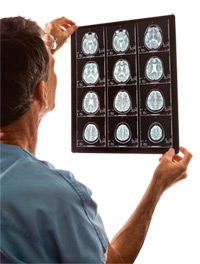Veterans' Healthy Living, Winter 2014
Chemotherapy and Alzheimer's - is There a Link?
Cancer is a life-changing diagnosis for patients and their families, and the same is true for Alzheimer's disease (AD). Researchers increasingly focus on causes and potential cures for each disease, and some studies show possible links between the two.
Laura Frain, MD, a geriatrician at VA Boston Healthcare System, says recent findings might hint at a connection between AD and chemotherapy, a common treatment for certain cancers.
"Our primary purpose was to see whether certain typesof cancer were associated with reduced risks of AD. By studying a database of nearly 3.5 million older Veterans, we indeed found that connection. But we were surprised to also see that, in addition to having cancer, chemotherapy seemed to offer some additional protection from AD."
 Dr. Frain says there is increasing evidence supporting the idea that AD may be some form of a "cancer of the brain," and this type of VA research could someday help lead to effective treatments, perhaps using drugs like chemotherapy. She cautions, however, that there is a great deal more to learn about potential links between chemotherapy and AD.
Dr. Frain says there is increasing evidence supporting the idea that AD may be some form of a "cancer of the brain," and this type of VA research could someday help lead to effective treatments, perhaps using drugs like chemotherapy. She cautions, however, that there is a great deal more to learn about potential links between chemotherapy and AD.
"We need to figure out if cancer survivors have an increased risk of other types of dementia that aren't related to AD, and future research needs to look at specific drugs, or agents, in the chemotherapy to see if those agents are the key. We're making progress, but we're not quite there yet."
Dr. Frain's work is a stellar example of how VA research has changed—and will continue to change—the way diseases are treated.
Chronic Pain | Nursing Care | Chemotherapy and Alzheimer's | LGBT Veterans | Colorectal Cancer

















